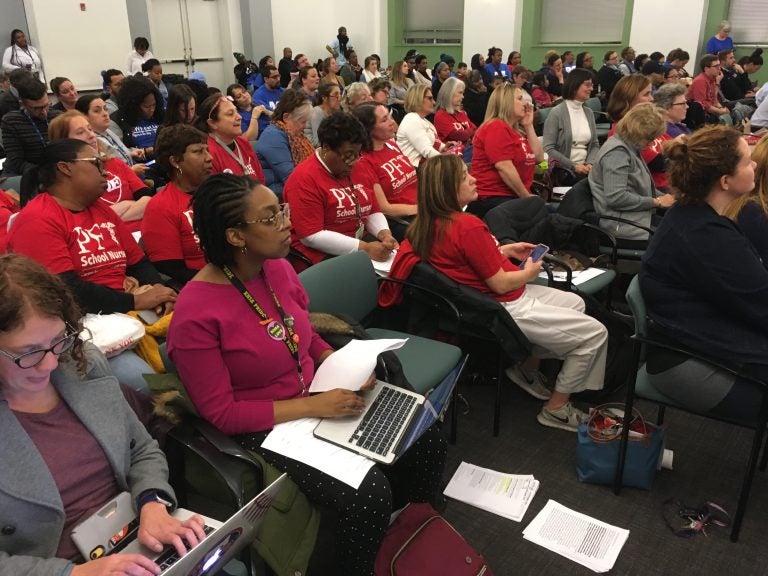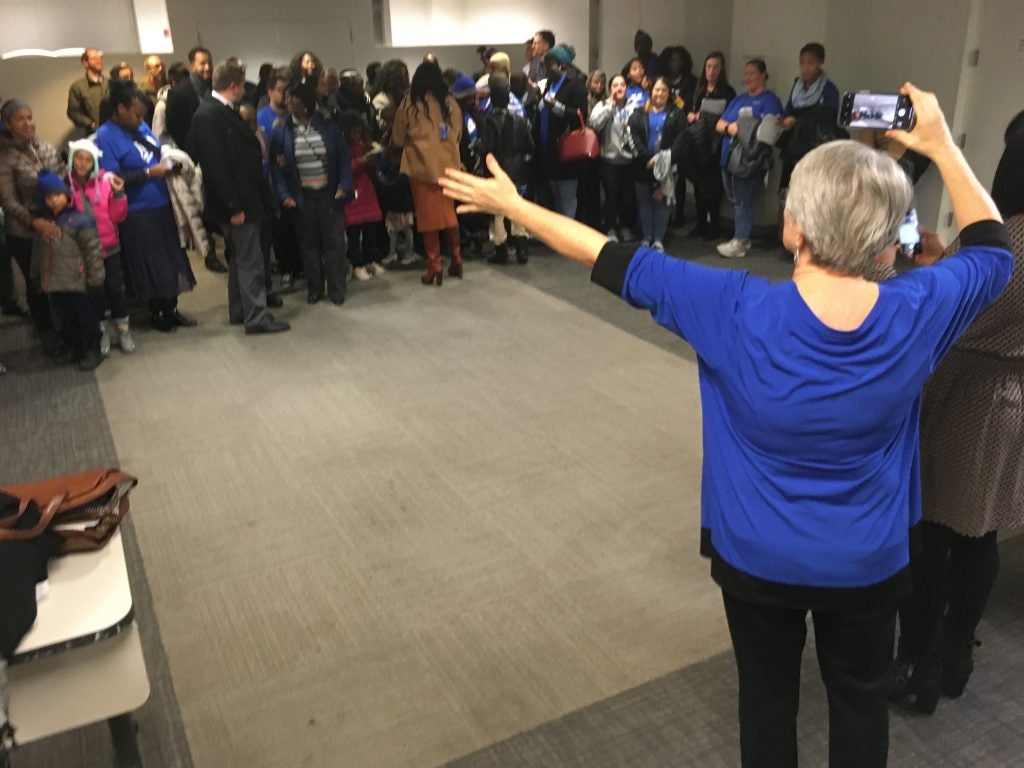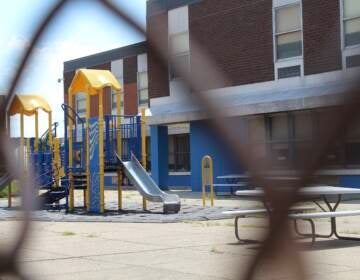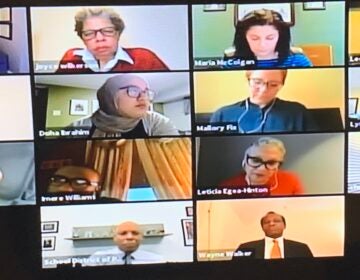Philly Board of Education renews six charters
The Board of Education met for the final time in 2019 on Thursday, approving five-year renewals for six charter schools.

School nurses turn out in force at Board of Education meeting. (Bill Hangley, Jr./The Notebook)
This article originally appeared on The Philadelphia Public School Notebook.
—
The Board of Education met for the final time in 2019 on Thursday, approving five-year renewals for six charter schools, and moving to resolve a health-care situation first raised last month.
The board also heard from staff at a neighborhood high school in Kensington that fears its growing roster of career and technical programs will be undercut by a proposed new charter high school in North Philadelphia.
Charters
The board unanimously approved five-year renewals for five Mastery charter schools, as well as for the Folk Arts Cultural Treasures Charter School, which was co-founded by City Council member Helen Gym.
Mastery supporters crowded the room, cheering loudly as a parade of staff and students from various schools delivered passionate testimony – about a dozen speakers in total. Typical testimony was that of Juliet Reyes, a Mastery Smedley parent and employee, who described a stable, supportive, effective school that deserves five more years. “As a parent, I don’t need the data. I see my daughters,” she said. “I will continue to fight for our school.”
The five Mastery renewals – Hardy Williams, Thomas, Smedley, Harrity and Lenfest – collectively educate about 3,500 students. The District’s renewal procedures do not include cost estimates, but the watchdog group the Alliance for Philadelphia Public Schools estimates the annual cost to be about $65 million annually, or about $325 million over the life of the charters, based on 2019 budget figures.
By the same estimates, FACTS, with about 500 students, will receive $6.3 million annually, or about $31.5 million over the five-year charter.
APPS’ Lisa Haver called the group’s figures “a rough estimate” based on past budget spending. Final spending figures will depend on enrollment and per-pupil allotments, which fluctuate annually, she said.

Board member Chris McGinley asked that in the future, Mastery be restricted to four speakers total, rather than four per school, based on the District policy of limiting public testimony to four speakers per issue. “Our decisions are driven by the law, not by advocates,” said McGinley.
Neighborhood high school worries about proposed new charter
The board also heard from staff at Kensington Health Sciences Academy (KHSA), a neighborhood high school which fears it will be undercut by a proposed new health-and-science charter school, to be established nearby in North Philadelphia.
KHSA Principal Nimet Eren asked the board to turn down the proposal to authorize the High School of Health Sciences Leadership Charter School, and keep funds and students flowing to her neighborhood school and its various career academies.
“I stand before the board today and ask you to invest in our students in our neighborhood high school,” she said. “We have tried very hard to cultivate connections for our students … but I still need your help. Don’t create competition for our students. Invest in us.”
Eren described a series of recent meetings with the Philadelphia School Partnership, a private fund which supports various charter and District school projects. Over the summer, she said, it appeared that PSP was going to help KHSA expand its programs, and she was thrilled by the prospect. But then, she said, PSP staff told her they had “an exciting opportunity” for her: PSP planned to invest in a new charter that would focus on health and science.
“I was a little confused,” Eren said. “It just seems like competition for my school …. I asked how this would be helpful, and they said I could learn from their … model.”
KHSA teacher Maddie Leubbert said the proposed charter would create “direct competition” for students, as well as for partners in the health care field. Leubbert urged the District to invest in KHSA’s existing career programs, rather than replicating them elsewhere. “Ostensibly, charters provide choice,” Leubbert said. “But our students already have this choice available to them.”
No representatives from PSP or the proposed new charter spoke at Wednesday’s meeting. The Board will hold a public hearing about new charter applications on Dec. 20, the final Friday before Christmas, a date that board Chair Joyce Wilkerson acknowledged was “less than ideal,” but which she said was required by law.
“We’re mandated to hold it in this timeframe, due to our outdated charter law,” Wilkerson said.
Critics called the hearing date “disgraceful” and “community disengagement,” but McGinley reminded them that Friday, Dec. 20, is “a work day here in the District, as is the following Monday.”
And Wilkerson noted that the Board can also hear testimony at committee meetings and receive it in writing. “All of those will be considered,” she said, urging KHSA staff to “make sure we get your testimony so we can incorporate it into the record.”
Nurse situation
The board moved to fill a gap created by the recent departure of the District’s top physician – a move that left nurses unable to legally distribute medications, creating what school nurse Anne Johnson called a “catastrophe.”
“We can’t give them anything. These kids are staying in our office all day,” complaining of headaches or menstrual cramps, and “parents are calling me, outraged,” said Johnson. “You know what’s happening? Kids are bringing their own medicine, self-medicating, giving their meds to other kids.”
Thursday, the Board approved a plan to pay the city’s Department of Health to serve as the District’s official doctor, a move that will restore school nurse’s ability to distribute medication. But it also asked Superintendent William Hite to deliver a report on Medicaid payments lost due to the fiasco – a figure that physical therapist Robin Roberts said could be as much as $2.5 million.
“Dr. Hite, I’d like to have a report at our next meeting about these billing problems,” said Wilkerson.
Board re-elects leaders
Joyce Wilkerson and Wayne Walker were unanimously re-elected as board president and vice president, respectively. Board members praised their leadership. Board member Chris McGinley said that it was important to maintain stability as the board prepares for new scrutiny from city lawmakers: “The mayor will be re-nominating all of us, and now there’s a new step of going through City Council,” McGinley said. “That will take several months, and for that reason I think it’s important to stick with leadership we have.”
Superintendent explains office renovation
Hite defended last summer’s decision to spend $604,000 remodeling the District’s executive offices, saying he wanted to provide “clarity behind the reasoning and rationale behind the project,” first reported by the Notebook. Hite said the decision was driven by internal reorganizations that required him to find more space for communications staff. “I’m happy to say the new space has increased work-space capacity by 70% and has better accommodated the additional people working inside the office,” said Hite, noting that the board authorized the expenses at its June meeting.
WHYY is your source for fact-based, in-depth journalism and information. As a nonprofit organization, we rely on financial support from readers like you. Please give today.




